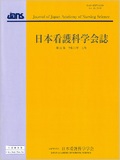Japanese
English
- 販売していません
- Abstract 文献概要
- 参考文献 Reference
要旨
目的:2年以上の勤務経験を有する新卒訪問看護師における自律的判断の様相を明らかにすることを目的とした.
方法:2年以上の勤務経験を有する新卒訪問看護師7名に半構造化面接を行い,質的記述的に分析した.
結果:2年以上の勤務経験を有する新卒訪問看護師における自律的判断のコアは,【利用者が自分らしい人生を生きられるかどうかを基に考える】という対象者中心思考を基に,【利用者の望む生活のためにできることを共に試行錯誤して決める】【利用者の状態変化時は緊急度を見極める】という生活と生命を護るための判断をすること,加えてよりよい判断を導くために【同事業所の看護師に自分から相談し判断を共有する】ことであった.
結論:2年以上の勤務経験を有する新卒訪問看護師は,利用者の自分らしさを重視する対象者中心思考を基に,利用者の望む生活を利用者と共に試行錯誤しつつ,状態変化時は緊急度を見極めていた.また同事業所の看護師に主体的に相談し,よりよい判断を導いていた.
Objective: To clarify aspects of autonomous nursing judgement in newly graduated visiting nurses with 2 years or more of experience.
Methods: We conducted semi-structured interviews with seven newly graduated visiting nurses with 2 years or more of experience. Responses were analyzed descriptively and qualitatively.
Results: The core structure of autonomous nursing judgement was for the nurses to make judgements about helping to ensure a better life and livelihood for patients (“finding out with the patient through trial and error what a better life with medical care means” and “noticing changes and determining the degree of urgency”) through patient-centered thinking (“considering what could be done to help patients live a life that is uniquely their own”). The nurses also make better judgements because they “take initiative in consulting nurses in the same station to share decisions.”
Conclusion: Newly graduated visiting nurses with 2 years or more of experience use patient-centered thinking to work with patients to find out through trial and error how patients can lead a better life. They determine the degree of urgency when the patient's condition changes and adjust decisions accordingly. They also take the initiative to consult senior nurses to guide better nursing judgement.
Copyright © 2021, Japan Academy of Nursing Science. All rights reserved.


